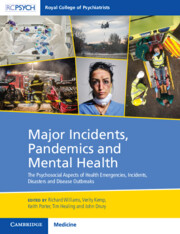 Major Incidents, Pandemics and Mental Health
Major Incidents, Pandemics and Mental Health Book contents
- Major Incidents, Pandemics and Mental Health
- Major Incidents, Pandemics and Mental Health
- Copyright page
- Dedication
- Contents
- Figures
- Tables
- Boxes
- Contributors
- Foreword by Dr Adrian James
- Foreword by Professor David Lockey
- Section 1 The Nature and Impacts of Twenty-First-Century Healthcare Emergencies
- Section 2 Clinical Aspects of Traumatic Injuries, Epidemics, and Pandemics
- Section 3 The Role of the Public in Emergencies: Survivors, Bystanders, and Volunteers
- Section 4 Responses to Meet the Mental Health Needs of People Affected by Emergencies, Major Incidents, and Pandemics
- Section 5 Sustaining and Caring for Staff During Emergencies
- Section 6 Designing, Leading, and Managing Responses to Emergencies and Pandemics
- Chapter 49 Preparing Effectively for Emergencies, Incidents, Disasters, and Disease Outbreaks
- Chapter 50 Leadership, Organisation, and Implementation of Emergency Preparedness
- Chapter 51 Caring for People who Have Disabilities and Are Affected by Emergencies, Incidents, Disasters, and Disease Outbreaks
- Chapter 52 Public Ethics in Emergencies: Learning from the COVID-19 Pandemic
- Chapter 53 Compliance with UK Government Measures During the COVID-19 Pandemic: Patterns, Predictors, and Consequences
- Chapter 54 The Threat of Pandemics to Interwoven Material, Social, Health, and Political Resources: Conservation of Resources as a Strategy for Avoiding Repeating Past Failure
- Chapter 55 Using Social Media to Reduce the Risks of Community-Wide Emergencies, Incidents, Disasters, and Disease Outbreaks
- Section 7 Key Lessons for the Way Forward
- A Glossary of Selected Key Terms Used in This Book
- Index
- References
Chapter 52 - Public Ethics in Emergencies: Learning from the COVID-19 Pandemic
from Section 6 - Designing, Leading, and Managing Responses to Emergencies and Pandemics
Published online by Cambridge University Press: 11 January 2024
- Major Incidents, Pandemics and Mental Health
- Major Incidents, Pandemics and Mental Health
- Copyright page
- Dedication
- Contents
- Figures
- Tables
- Boxes
- Contributors
- Foreword by Dr Adrian James
- Foreword by Professor David Lockey
- Section 1 The Nature and Impacts of Twenty-First-Century Healthcare Emergencies
- Section 2 Clinical Aspects of Traumatic Injuries, Epidemics, and Pandemics
- Section 3 The Role of the Public in Emergencies: Survivors, Bystanders, and Volunteers
- Section 4 Responses to Meet the Mental Health Needs of People Affected by Emergencies, Major Incidents, and Pandemics
- Section 5 Sustaining and Caring for Staff During Emergencies
- Section 6 Designing, Leading, and Managing Responses to Emergencies and Pandemics
- Chapter 49 Preparing Effectively for Emergencies, Incidents, Disasters, and Disease Outbreaks
- Chapter 50 Leadership, Organisation, and Implementation of Emergency Preparedness
- Chapter 51 Caring for People who Have Disabilities and Are Affected by Emergencies, Incidents, Disasters, and Disease Outbreaks
- Chapter 52 Public Ethics in Emergencies: Learning from the COVID-19 Pandemic
- Chapter 53 Compliance with UK Government Measures During the COVID-19 Pandemic: Patterns, Predictors, and Consequences
- Chapter 54 The Threat of Pandemics to Interwoven Material, Social, Health, and Political Resources: Conservation of Resources as a Strategy for Avoiding Repeating Past Failure
- Chapter 55 Using Social Media to Reduce the Risks of Community-Wide Emergencies, Incidents, Disasters, and Disease Outbreaks
- Section 7 Key Lessons for the Way Forward
- A Glossary of Selected Key Terms Used in This Book
- Index
- References
Summary
This chapter explores the lessons that can be drawn from the ways in which bioethical governance operated during the COVID-19 pandemic. It examines the way in which our thinking is framed as this may substantially determine the policy choices that we make, it explores the contemporary context of public reasoning, and finally it examines the governance of ethical concerns. It proposes that there must be openness and transparency about the ethical issues and approaches that are being applied. It recognises that people do not necessarily need to agree with government decisions, but they do need to accept that they are reasonable and responsible. These principles can be brought together by using the techniques of deliberative democracy to review the ethical frameworks that have been developed during the pandemic for revision as necessary. Lessons can be drawn to help people prepare better for the governance of bioethical deliberations in future emergencies.
- Type
- Chapter
- Information
- Major Incidents, Pandemics and Mental HealthThe Psychosocial Aspects of Health Emergencies, Incidents, Disasters and Disease Outbreaks, pp. 394 - 402Publisher: Cambridge University PressPrint publication year: 2024
